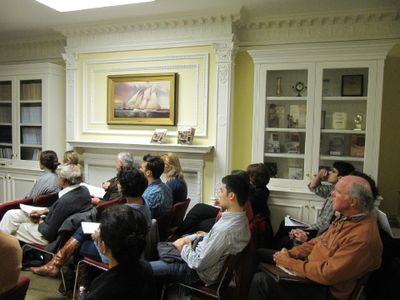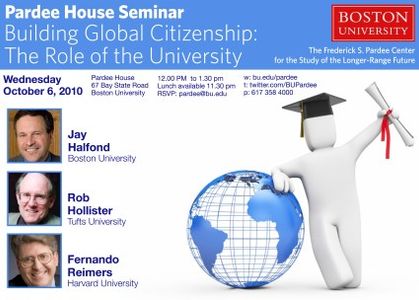Experts Discuss Global Citizenship at Pardee House Seminar
On Wednesday, October 6, 2010, The Frederick S. Pardee Center for the Study of the Longer-Range Future held a lunch seminar on ‘Building Global Citizenship – The Role of the University’. Part of the ‘Pardee House Seminars’ series, the event featured Dean Jay Halfond, Dean Robert Hollister and, Professor Fernando Reimers, and was moderated by Prof. Adil Najam, Director of the Pardee Center.

Prof. Fernando Reimers is the Ford Foundation Professor of International Education and Director of Global Education and of International Education Policy at Harvard University. He began the conversation by providing a background of the civic nature of public education and defining global citizenship education as equipping citizens with competencies to navigate seamlessly across cultures. He suggests that the role of the university in global citizenship education is to 1) provide a narrative about global citizenship, 2) provide assessment tools to measure the competencies of global citizenship, 3) to place the pedagogy of global citizenship competencies as a priority, and 4) to cultivate knowledge and understanding of global citizenship.
Dean Rob Hollister is Dean of the Jonathan M. Tisch College of Citizenship and Public Service at Tufts University and holds the Pierre and Pamela Omidyar Chair of Citizenship and Public Service. He started his comments by noting the global trend of universities engaging in global citizenship education. He suggested that the university can play a role in crafting its curricula to include global citizenship education, applying its resources to address social issues and in its institutional practices and policies. Dean Hollister also shared about The Talloires Network, an international association of institutions committed to strengthening the civic roles and social responsibilities of higher education.

Dean Jay Halfond is the Dean of the Metropolitan College and an associate professor of Administrative Sciences at Boston University. He challenged the effectiveness of the university’s current efforts at creating global citizens. He argued that exposure is not enough and emphasized the need to integrate global assets meaningfully within the university. He suggested that universities can play a role by avoiding tokenism on global citizenship education, and providing institution-wide opportunities for inter-cultural and cross-cultural learning and global citizenship competencies. He also highlighted the need to exploit technology to bring together people of different cultures and locales.

Following the presentations the audience engaged in a lively discussion with the panelists. Prof. Najam began the Q&A session by asking about the changing geography of global education and its implications for creating global citizens. Some of the other issues discussed included the challenges in creating global collaborations, the role of government in creating global education policy and the value of global citizenship education.
The video of the seminar will be soon made available at the Pardee Center’s multimedia webpage.